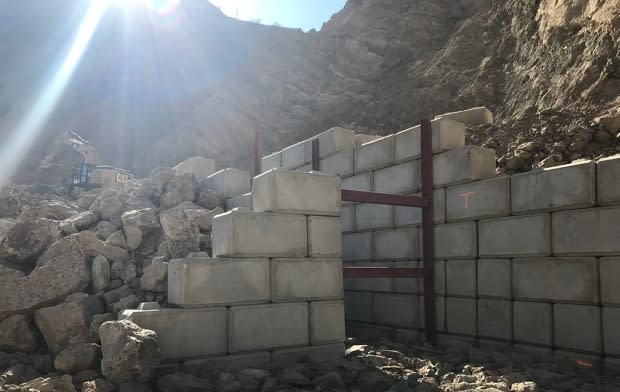Contract to clear B.C.'s Big Bar landslide balloons to $52.5M as crews race to allow for salmon migration
The cost of the federal contract for clearing out the Big Bar landslide has tripled to $52.5 million as crews try to meet the "very, very difficult" goal of allowing salmon to migrate naturally along the Fraser River in B.C.'s southern Interior.
Peter Kiewit Sons' contract with the federal government has now been amended 17 times since it was awarded to the construction giant on Dec. 31 at an original value of $17.6 million.
On a call with reporters earlier this week, Fisheries and Oceans Canada (DFO) project leader Gwil Roberts said Kiewit has fulfilled the terms of the original contract, but it became obvious early on that more work would be necessary.
"We knew from the start that this is a very difficult place to work and there's a mass amount of material that has landed in this river. We're talking about 75,000 cubic metres of rock," Roberts said.
"To remove enough of that to restore natural fish passage … it was a very, very difficult objective and that's the challenge that is still facing us."
In the meantime, with the annual salmon runs fast approaching, "what we realized in a pretty timely fashion here was that we needed other measures for fish to move over the slide site," Roberts said.
That includes building a concrete fish ladder and installing a pneumatic tube system to help salmon move past the rock fall.

The Big Bar landslide happened in a remote area north of Lillooet some time in November or December 2018, but it was not reported to Fisheries and Oceans Canada until June 2019.
The landslide completely blocked migration routes for several salmon runs, and prompted officials at multiple levels of government to organize a rescue mission that saw thousands of salmon lifted by helicopter across the rocks that blocked their migration route.
But a large number of those salmon died before reaching their spawning grounds, and federal scientists have warned some chinook and sockeye populations face a "meaningful chance of extinction" as a result.
2019 federal contracts worth $5M
Last year, DFO signed contracts worth more than $5 million with other companies for work related to the landslide, according to federal government documents obtained through an Access to Information request.
But none of the rocks or debris that had fallen into the Fraser had been cleared away before Kiewit crews began work on the site this year, a spokesperson for Fisheries and Oceans Canada said this week.
"Much of the work in 2019 focused on manipulating existing rocks through the use of hydraulics and small bursts to create resting pools to restore immediate fish passage," Kavitha Palanisamy wrote in an email to CBC.
So far, DFO has spent $28.6 million on the project, Palanisamy said. That total doesn't include spending by other government agencies, including the provincial forests ministry, which has awarded contracts for everything from portable toilets to heavy equipment rentals.
Kiewit has made some notable progress on the slide this year, including blasting work that removed portions of the obstruction from the river.
Meanwhile, there was an unexpected rock fall earlier this month on the project site, bringing down a bit less than two cubic metres of rock. WorkSafeBC is investigating, and Kiewit has now installed mesh curtains to protect workers from further incidents, according to the latest DFO update.
Kiewit is currently awaiting trial on a charge of criminal negligence causing the death of Sam Fitzpatrick, who was killed by a falling rock in 2009 on another Kiewit worksite near Toba Inlet on B.C.'s Sunshine Coast.

